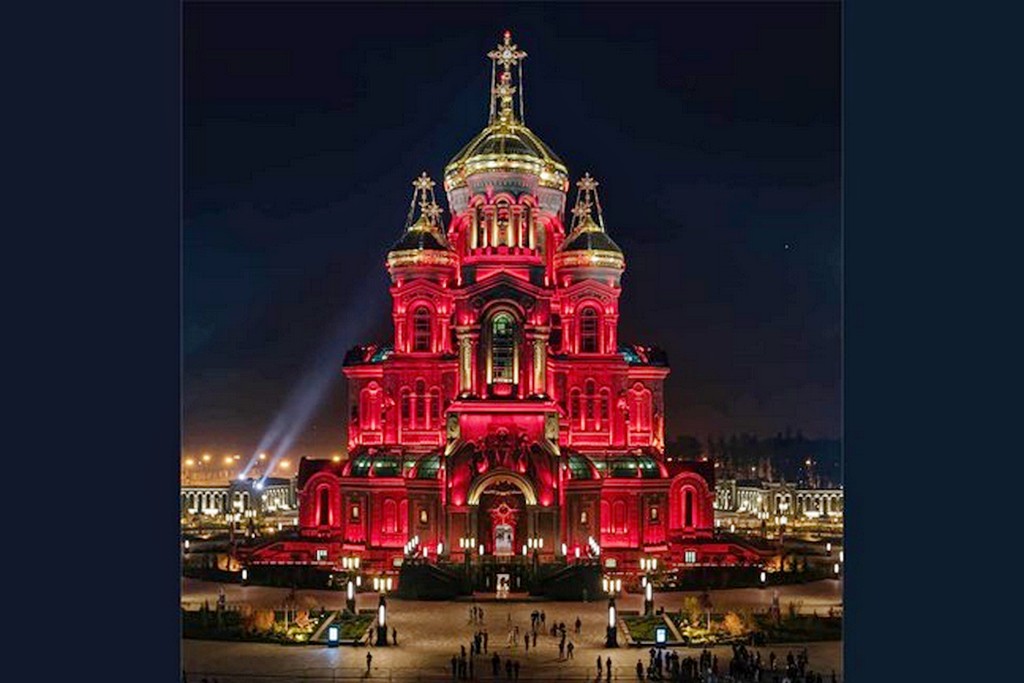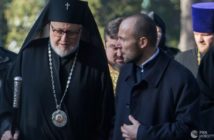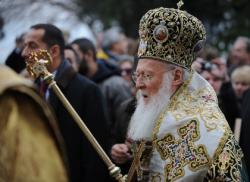Source: Public Orthodoxy
To:
His Holiness Bartholomew, Archbishop of Constantinople, the New Rome, and Oecumenical Patriarch
The Holy Father Francis, Pope of the Catholic Church
His Holiness Garegin, Primate and Catholicos of All Armenians
His Grace Justin Welby, Archbishop of Canterbury, Primate of All England and Head of the Anglican Communion
Rev Dr. Panti Filibus Musa, Archbishop of the Lutheran Church in Nigeria, Chairman of the Lutheran World Federation
Mrs. Najla Kassab Abousawan, President of the World Communion of Reformed Churches (WCRC)
Rev Dr Jerry Pillay, General Secretary of the World Council of Churches
We address your Excellencies, leaders of the major Christian Churches and confessions, to plead with you. We ask that you publicly address four acute problems that large-scale military conflicts in the modern world pose to all Christians:
- Using religion to justify violence
- Injustice
- Religious nationalism
- Outright lies emanating from church pulpits
These pressing issues are amplified within the context of the Russian war of aggression in Ukraine. From the very beginning, this conflict took on a distinctive character, in which Russia, a nation primarily identifying itself as Orthodox Christian, invaded Ukraine, another predominantly Christian nation, without any immediate provocation from the side of the latter. Ironically, citizens of both countries were, until recently, affiliated with one and the same Orthodox Church.
We refrain from challenging the propaganda clichés that posit Russia’s invasion of Ukraine as proxy war with the West. Such assertions conveniently align with the perspectives of armchair analysts, but greatly oversimplify the situation. The oversimplification becomes apparent when one examines the frontlines from a human perspective, in which Ukrainian and Russian soldiers are the ones sacrificing their lives, rather than from a geopolitical one—especially a Western geopolitical one.
Russia’s aggression set Orthodox Christians against neighboring Orthodox Christians, divided families, and disrupted the peaceful lives of tens of millions of people in both countries. Many have lost families and friends; have become exiled or internally displaced as refugees; or have become wounded or traumatized, not only physically and psychologically, but also spiritually.
Christians across the world have not stood idly by. Instead, they have joined with hundreds of millions of non-Christian people who also value the sacredness of life and the dignity of the human person. Together, these ordinary people have freely chosen to stand in solidarity with the victims of this invasion. Communities and organizations worldwide, including those rooted in Christian traditions, continue to offer practical care and assistance in response to these challenges.
Today, it is crucial for all Christians to undertake another pressing task: to diligently explore compelling responses to questions regarding human dignity and our divine responsibility to safeguard life and steward creation. This exploration must include considerations of the permissibility and justification of violence, the right to immediate self-defense, and the engagement in combat against evil—particularly when viewed through the lens of the Gospel. The presence of war at our doorstep indicates that we are still in search of answers.
The Russian Orthodox Church and Russia’s Aggression against Ukraine
Our shared concern and plea to you are chiefly tied to the stance articulated by the Russian Orthodox Church (ROC). Patriarch Kirill has declared full support for Russian aggression. He has ensured that the institutional church assumes patronage of the Russian army occupying part of Ukraine. In so doing, the ROC demonstrated an unambiguous lack of interest in peacemaking and compassion. And yet, even given its entanglement with nationalist militarism, the ROC still claims to be the major Church of the Eastern Christian tradition, and the ROC claims to speak as the principal guardian of “traditional values.”
During much of the last century, the Orthodox Church in Russia endured harsh persecutions under atheistic Soviet regimes. After the collapse of the USSR, the ROC seemed to have entered a renaissance. Old churches and cathedrals were restored, and new ones were built. The Bible and theological texts were once more in print. Monasteries and convents were re-opened, along with Orthodox schools and theological seminaries. These events were welcomed and encouraged by the greater Christian world.
Simultaneously, despite specific disquieting indicators (often overlooked by the broader Christian community), the Russian Orthodox Church reasserted its alignment with the State, positioning itself as closely as the authorities permitted. Those in power treated the Church as an integral component of the neo-imperial regime. The ROC actively engaged in the Kremlin’s apparatus of propaganda and violence. The most striking manifestation of the ROC’s collaboration is evident in its religious and even pseudo-theological justification for the unbridled aggression of Russia’s regime against a rightfully sovereign Ukraine, coupled with the continued blessing of the invasion and all its participants.
The sins of justification and benediction are not solitary deeds of individual bishops or idiosyncratic priests but institutional transgressions. These sins manifest the overarching, unified ideological stance of the entire Russian Orthodox Church, overseen and upheld by the Patriarch of Moscow and All Russia. Public anti-war opinions within the Church are infrequent, with clergy who voice opposition to the war often subjected to sham trials in ecclesiastical or secular tribunals. They face repercussions ranging from suspension to defrocking. In some cases, they are compelled to leave the country.
Russia’s war against Ukraine has become the bloodiest European war since the Nazis started World War II by invading Poland. In the aftermath of that world war, such horror was not ever supposed to happen again. Not only is the horror happening again, but this time, the horror has been initiated by one of the countries that had itself suffered heavily from Nazi aggression, suffered great losses, came out victorious, and later gave firm international commitments to promote peace in every possible way.
Over the past two years, Christian charitable organizations in Europe and America have been fervently involved in supporting Ukraine. Their efforts extend beyond providing tangible assistance. They also stand as vocal critics, morally condemning Russia’s aggression. This steadfast support serves as a profound testament to the enduring historical legacy of Christian mercy and solidarity.
It is of utmost importance to emphasize that President Vladimir Putin of the Russian Federation, alongside Russia’s politicians and soldiers, has not only violated their international obligations. More profoundly, he has committed a blasphemy against God. This pertains to individuals who identify themselves as Christians and who often criticize the West for deviating from Christian values. Despite engaging in the construction of new churches and monasteries, lighting candles, fervent prayer, participation in sacraments, and partaking of Holy Communion, these individuals paradoxically compound their sins by issuing orders for murders, personally engaging in war crimes, and publicly justifying actions that run contrary to humanity and the Creator.
The Gospel and the Moral Responsibility of Christians
For us Christians who received the gift of the Holy Spirit, our moral responsibility to life and the flourishing of God’s creation is part of baptismal vows and is closely bound to the Gospel teaching and to our confessing faith in the Lord Jesus as God-Man and the Savior of the world. We are compelled to strive to be holy as our Father in Heaven is holy (Mt: 5:43-48).
Regrettably, however, unscrupulousness and immorality have become commonplace among numerous ostensibly Christian politicians and senior government officials, with Russia being no exception. Realpolitik often takes precedence over ethical and moral considerations. The situation takes on an added dimension of moral reprehensibility when the Patriarch of a Church, along with bishops and many parish priests, not only justifies an aggressive war but actively encourages Christians to engage in conflict with neighboring nations, even those considered brethren. Such transgressions represent a double sin, a blatant departure from the imitatio Christi, a blasphemous desecration carried out with conscious intent, openly and devoid of any hint of contrition. It has reached a point where silence can no longer be maintained in the face of such egregious acts.
“Blessed are those who hunger and thirst after righteousness, for they will be filled” (Mt. 5:6). For us, these words are a call not only to seek truth and righteousness but also to reject all lies, omissions, and manipulations of facts. The perpetrators have forgotten the all-seeing eye of the Creator (Ps. 139:7-12). In the new era of smartphones and instant connectivity, this lying has become a constitutive part of launching any “hybrid war,” a war that weaves together state and non-state actors, and strategies of conventional and irregular warfare, including the dissemination of fake news. In a hybrid war, anyone who participates in the lie directly participates in such a war.
It is not enough to condemn the war in Ukraine. It is not enough to call for a ceasefire and, more generally, to call for peace. There is now a need to shine light on the true cause of the war; there is a need to call out who unleashed it to evaluate the criminal actions for what they are.
Not a single bishop in the Russian Federation has preached peace during the past two years of this war, but many of them pray and preach about the victory of Russia over Ukraine. What a shame for the most prominent Orthodox Church in the modern world. And the rest of the institutional Christian world is remaining silent. Shall we say that we are at the point when silence becomes acceptance?
We strongly believe that Christian leaders are called to recognize their ministry first and foremost as a prophetic ministry, and this assumes that they are capable of confronting evil, demonstrating wisdom, justice, and courage.
Personal Responsibility of the Primate of the Russian Orthodox Church
“Blessed are the peacemakers, for they will be called the sons of God” (Mt 5:9). Patriarch Kirill has not once conveyed sympathy or expressed condolences for the Ukrainians who have endured loss, injury, or displacement. His stance remains unbowed by the heartbreaking reality of children’s deaths and suffering. The patriarch has shown no lament for those subjected to torture and torment by Russian soldiers. On numerous occasions, he and his clergy have actively encouraged young men from Russia to participate in this devastating conflict. Rather than acknowledging the human toll, he consistently reiterates his proclamation that Russia stands on the side of light, engaging in a delusional great war against the forces of darkness.
This lack speaks of the deep spiritual and moral fall of the Russian Orthodox Church and its spiritual leaders. Patriarch Kirill (Gundyaev) himself has for many years neglected his pastoral duty with respect to Ukrainians, while belittling their dignity and supporting a deeper division within Ukrainian Orthodoxy. He has closed his eyes to political repression and multiple violations of civic freedoms and human rights in Russia and has justified these violations by his silence and occasions of explicit support. He has supported the Russian regime’s aggressive, anti-Christian tendencies promoted under the guise of such manipulative formulations as “Russian world” or “traditional values.” He has supported the State’s lies about the “internecine war” in Ukraine by composing prayers and demanding that they be included in liturgical practice. Finally, he has supported and justified aggression against Ukraine through his pastoral praxis and theological discourse.
This use of liturgy, theological discourse, and pastoral influence has given multiple examples of how Patriarch Kirill, together with his bishops and many priests, have violated the sixth commandment to the Decalogue: “Thou shall not kill.” They have repeatedly twisted the sacrament of Christian benediction into a sanctioning of murder of the citizens of a neighboring Christian country. Occasions of such violations have become too numerous, and too well-documented on YouTube, X, and elsewhere, to be considered an accident.
The support of this “hybrid war” of unprovoked aggression, the justification of its violence, and the persecution of any priest and believer who speaks the truth against the war—all these committed acts demonstrate a conscious and deliberately-argued position. All these testify to the extent that the Russian Orthodox Church has deviated from the Gospel and preaches something alternative to the Word of God. All Christians must critically ask whether the teaching preached publicly and unabashedly by the representatives of the Russian Orthodox Church is indeed the true message of the Christ event.
Wishing and praying for peace while failing to identify the aggressor, without distinguishing between perpetrators and victims, and without acknowledging the right of a country that faces war of aggression to defend itself, does not promote true and just peace.
Prophetic Ministry and Standing in Truth
This contemporary moment of suffering and dread demands that the words of pastors, Church leaders, and prophets be firmly rooted in the Holy Scriptures and the loving example of Jesus the Christ and be proclaimed clearly and strongly throughout the world.
During times of conflict, the pursuit of diplomatic and political objectives can obfuscate the prophetic voice bestowed upon the Church through its divine mission. Often the Church places value on peacemaking and involves itself in negotiations with the warring parties to achieve a quick détente or ceasefire. However, it must be honestly recognized, by Church officials and the faithful alike, that these efforts have so far failed to bring about any lasting results. Church diplomats too often neglect at least the Gospel ethic in their pursuit of political goals and careerist aspirations.
Recognizing that everything possible must be done to end the war and establish a just peace, we are awaiting from you the word that is “living and active, sharper than any two-edged sword” (Hebrews 4:12).
It is disheartening that, even two years into the conflict, there is no official Church document condemning the war comprehensively. More disappointingly, there is a lack of consistent and unequivocal denunciation of Russia’s aggression while characterizing the total support for this war from high-ranking church officials in the Russian Orthodox Church as a scandal.
We express our support for those few Christian leaders who have personally made public statements on this matter. Their steadfast stance demonstrates a commitment to truth and justice, and we commend their efforts in upholding the values of our faith. It is our sincere hope that such expressions of moral clarity will serve as inspiration for further collective action within the broader Christian community.
We beseech you to actively and immediately engage with the appropriate international institutions to facilitate the establishment of an international task force dedicated to holding accountable, through sincere and impartial analysis, those bishops, priests, and laity within the Russian Orthodox Church whose statements, testimonials, sermons, communications, and fabrications have sanctioned and bestowed divine approval upon violence, war, and aggression against the people of Ukraine.
Numerous publications have meticulously analyzed these distressing facts, underscoring the urgency for a formalized initiative that compels the attention of Churches and cannot be disregarded. Your active engagement in establishing such an entity will be a significant step toward addressing these critical issues at an institutional level.
A Church that only outwardly remains “Christian” but has lost its evangelical spirit cannot be a sister to those Churches and communities that follow the Gospel of our Lord Jesus Christ.
The endeavors elucidated above transcend a mere conflict with the Russian Orthodox Church. Rather, they embody a dedicated striving on its behalf—for the Church, for the community of believers guided by the Holy Spirit and the Gospel, liberated from deceptive political theology and detrimental religious ideology. Progressing resolutely toward genuine peace requires the fearless proclamation of truth, regardless of the inherent challenges it may pose.
You are summoned to denounce injustices, advocate for repentance and atonement, and actively seek transformative change within the temporal realm. We ask you, our pastors, to courageously proclaim the inconvenient yet profound truth.
Sergei Chapnin, Orthodox Christian Studies Center of Fordham University, USA
Aristotle Papanikolaou, Orthodox Christian Studies Center of Fordham University, USA
George Demacopoulos, Orthodox Christian Studies Center of Fordham University, USA
Nathaniel Wood, Orthodox Christian Studies Center of Fordham University, USA




